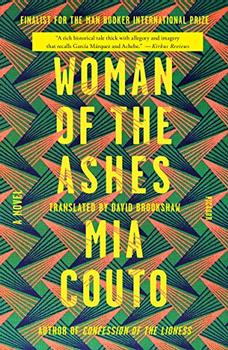Summary | Excerpt | Reviews | Beyond the Book | Readalikes | Genres & Themes | Author Bio

A Sands of the Emperor Novel
by David Brookshaw, Mia Couto
On that January morning in 1895, the windows we had left open made people think a child had been born. Once again, I had dreamed I was a mother, and the smell of a newborn child permeated the whole house. My attention was gradually drawn to the rhythmic sweeping of a broom. I wasn't the only one waking up: that gentle sound was rousing the whole house. It was our mother, cleaning the yard. I went to the door and watched her, slim and elegant, in a swaying curve, as if she were dancing, and in the process turning to dust.
The Portuguese don't understand why we take such care to sweep around the outside of our houses. As far as they are concerned, it makes sense to sweep only inside buildings. It never occurs to them to take a broom to the loose sand in the backyard. Europeans don't understand: For us, what's outside is still inside. The house isn't the building. It's the place that is blessed by the dead, inhabitants who ignore doors and walls. That is why we sweep the yard. My father, however, never accepted this explanation, which he found too complicated: We sweep the sand for a much more practical reason: we want to know who's come and gone during the night.
On that morning, the only footprint was that of a simba, a feline creature that snoops around our chicken coops in the dead of night. Mother went to check on the hens. There were none missing. The wildcat's lack of success reflected our own failure: if the creature had been seen, we would have promptly hunted it down. The spotted skin of the females was sought-after as a sign of prestige. No present could give more pleasure to a great chief, above all to the commanders of the enemy army, who adorned themselves in such a way that they lost their human form. That is why a uniform is worn: to rob a soldier of his humanity.
The broom firmly wiped away evidence of the nighttime intrusion; the memory of the simba was erased in a matter of seconds. After that, Mother walked off down the path to fetch water from the river. I stood watching her disappear into the forest, elegant and upright in her brightly colored cotton. My mother and I were the only women not to wear the sivanyula, a material made from the bark of trees. The clothes that covered our bodies were bought at the Portuguese store, but they made us the target of women's envy and men's desires.
When my mother got to the river, she clapped her hands, asking for permission to draw near—rivers are the dwelling places of spirits. Leaning forward over the riverbank, she peered along the edge to make sure there wasn't a crocodile waiting to ambush her. Everyone in the village believes that the great reptiles have "owners" whom they alone obey. Chikazi Makwakwa collected water, facing the mouth of her pot downstream so as not to go against the current. When she was getting ready to return home, a fisherman offered her a beautiful fish, which she wrapped in a piece of cloth that was tied at her waist.
When she was already near home, something unexpected happened: a group of VaNguni soldiers burst out of the thick bush. Chikazi took a few steps back, at the same time thinking, I escaped the crocodiles only to be devoured by even more violent monsters. Ever since the war of 1889, Ngungunyane's forces had ceased ranging over our lands. For half a dozen years, we had enjoyed peace, thinking that it would last forever. But peace is a shadow on impoverished ground: all that's needed to make it disappear is the passage of time.
The soldiers surrounded our mother and soon realized she understood them when they spoke in Xizulu. Chikazi Makwakwa had been born in the south, so the language of her childhood was very close to that of the invaders. Mother was a mabuingela, one who walks ahead to brush the dew from the grass. That was the name the invaders gave to the people whom they used to clear their path across the savanna. My brothers and I were the products of this mixture of histories and cultures.
Excerpted from Woman of the Ashes by Mia Couto. Copyright © 2018 by Mia Couto. Excerpted by permission of Farrar, Straus & Giroux. All rights reserved. No part of this excerpt may be reproduced or reprinted without permission in writing from the publisher.
Your guide toexceptional books
BookBrowse seeks out and recommends the best in contemporary fiction and nonfiction—books that not only engage and entertain but also deepen our understanding of ourselves and the world around us.